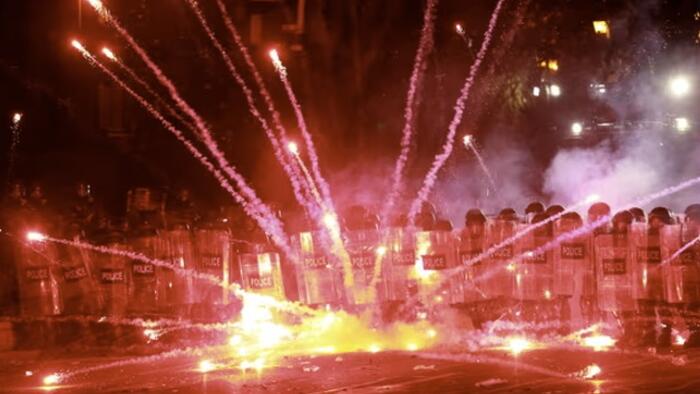In recent weeks, the Republic of Georgia has been engulfed in unprecedented protests, driven primarily by the ruling Georgian Dream party’s decision to suspend talks on European Union (EU) membership for a period of four years. These demonstrations in the capital city of Tbilisi have grown in size and intensity, commencing several evenings ago, with significant clashes occurring between riot police and pro-EU protesters. The protests erupted following Prime Minister Irakli Kobakhidze’s remarks, which accused some European politicians and the European Parliament of “blackmail” regarding the contentious parliamentary elections held in October, which were marred by allegations of irregularities. In light of the European Parliament’s criticism of the Georgian parliamentary elections, where Georgian Dream secured victory amidst claims of electoral fraud, the Prime Minister’s announcement not only halted EU discussions but cast a shadow over Georgia’s aspirations for European integration.
Prime Minister Kobakhidze’s statements have further inflamed tensions, as he asserted that the Georgian government will refrain from addressing EU membership until 2028 while labeling European criticism as “offensive and shameful.” His assertion of halting progress toward European integration has not only drawn the ire of the opposition but has also prompted massive protests across the country. As demonstrators continue to confront riot police equipped with tear gas and water cannons, the government has issued warnings against any unlawful conduct, escalating the already charged atmosphere. The Prime Minister warned that those involved in the protests would face severe consequences, along with any politicians who “sacrifice members of their violent groups.” This stern response has highlighted the government’s commitment to maintaining order, even as the situation deteriorates under the pressures of widespread civil unrest.
The demonstrations, marked by escalating violence, have seemingly galvanized a segment of the Georgian populace that is fervently pro-EU, opposing what they perceive as the current government’s drift towards authoritarianism and alignment with Russia. Numerous reports have emerged of injuries sustained during clashes with law enforcement, with significant numbers of protesters, police, and media personnel requiring hospitalization. Scenes from the protests have shown citizens expressing their dissent dramatically, including acts of vandalism against local government offices, such as egg-throwing incidents directed at the Georgian Dream party facilities. Making symbolic statements against the party’s leadership, protesters also burned an effigy of Bidzina Ivanishvili, the billionaire founder of Georgian Dream, who has faced allegations of continued influence over the political landscape in Georgia.
In the aftermath of the October elections, the political climate in Georgia has been marked by accusations of Russian interference and oligarchic control led by pro-Kremlin figures, reflecting broader geopolitical tensions. Opposition leaders have articulated that the ruling party’s actions have fostered an environment rife with division and conflict, arguing that the Georgian Dream party’s choice to turn its back on European integration signifies a betrayal of the nation’s democratic principles and aspirations. President Salome Zurabichvili, who is aligned with the pro-EU camp, criticized the government’s actions, characterizing the current situation as a declaration of war against its own citizens rather than an effort toward peace and stability. The combination of civic unrest and high political stakes underscores the fragility of Georgia’s aspirations for closer ties with the EU amid the looming Russian influence.
As the protests have garnered momentum, the broader consternation surrounding Georgia’s political landscape reveals a deep divide within the population about the direction of the nation. The ongoing demonstrations signify not only a reaction against perceived governmental overreach but also a struggle between differing visions for Georgia’s future, reflecting a yearning for integration into European political and economic structures. The conflict is emblematic of fears that Georgia may slip further under Moscow’s shadow, with many citizens passionately opposing any potential regression towards authoritarianism. Beliefs among protestors range from a simple desire to uphold electoral integrity to a more profound ideological commitment to alignment with Western ideals and standards.
In conclusion, the ongoing protests in Georgia illuminate a critical chapter in the country’s political narrative, characterized by escalating tensions between citizens and the ruling party. As demonstrators voice their demands for transparency, accountability, and European integration, the Georgian government finds itself at a crossroads. The future of Georgia’s political posture toward Europe, amid accusations of foreign interference and oligarchic dominance, remains uncertain. Significant public discontent suggests that the ruling party’s actions have not only alienated a portion of the population but have also resulted in a broader reconsideration of Georgia’s path forward. Ultimately, the current unrest may play a significant role in defining the nation’s identity and aspirations in an increasingly polarized global landscape.

